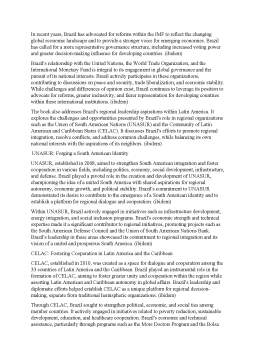Extras din referat
Abstract:
In an era of increasing global interconnectedness, the significance of understanding a nation's security and strategic culture cannot be overstated. Brazil, as the largest country in Latin America and one of the emerging powers on the world stage, holds a pivotal role in shaping regional dynamics and global affairs. This research paper delves into a comprehensive examination of Brazil's security and strategic culture, aiming to shed light on the factors that have shaped its national security policies, military doctrine, and international relationships.
As the fifth-largest country by land area and population, Brazil stands as a prominent actor in the geopolitical landscape of the 21st century. Its vast natural resources, expanding economy, and growing influence in regional organizations make it an intriguing subject for in-depth analysis. While Brazil's internal dynamics and socioeconomic challenges have been the focus of much scholarly attention, there is a pressing need to explore the country's security and strategic culture to gain a deeper understanding of its national security policies and military posture. (Taylor & Stuenkel, 2015)
Security and strategic culture encapsulate a nation's beliefs, values, historical experiences, and collective perceptions regarding security threats, the use of force, and the pursuit of national interests. These cultural factors significantly influence a country's defense strategies, military doctrine, decision-making processes, and foreign policy behavior. Unraveling Brazil's security and strategic culture requires a multidimensional approach that considers historical legacies, domestic politics, external influences, and regional dynamics. (ibidem)
Brazil's history of colonialism, independence, and nation-building has left an indelible mark on its security mindset. The country's territorial vastness, border challenges, and historical conflicts have shaped its approach to defense and national security. Furthermore, Brazil's experiences under authoritarian rule, its transition to democracy, and the ongoing struggle with organized crime have played a critical role in shaping its security priorities and the role of its armed forces. (ibidem)
The examination of Brazil's security and strategic culture also necessitates an exploration of its regional aspirations and global ambitions. As a prominent member of regional organizations such as the Union of South American Nations (UNASUR) and the Community of Latin American and Caribbean States (CELAC), Brazil has sought to assert itself as a regional power and champion of South-South cooperation. Moreover, the country's engagement in peacekeeping missions, defense partnerships, and nuclear ambitions highlight its growing aspirations for global influence. (ibidem)
By comprehensively analyzing Brazil's security and strategic culture, this research paper aims to provide valuable insights into the country's defense policies, military capabilities, and foreign relations. Understanding the underlying cultural factors that influence Brazil's security decision-making process is crucial for policymakers, analysts, and scholars alike. It not only enhances our comprehension of Brazil's regional and global engagements but also facilitates effective diplomacy, cooperation, and conflict resolution. (ibidem)
In the following sections, this paper will delve into the historical, political, and social dimensions that have contributed to Brazil's security and strategic culture. It will examine the work of Oliver Stuenkel, “Brazil on the Global Stage: Power, Ideas, and the Liberal International Order”, a comprehensive book relevant to the topic of research. By doing so, this research endeavor strives to unravel the complex tapestry of Brazil's security and strategic culture, shedding light on the dynamics that shape its present and future role in the international arena. (ibidem)
"Brazil on the Global Stage: Power, Ideas, and the Liberal International Order," edited by Oliver Della Costa Stuenkel, delves into Brazil's evolving role in the international arena, focusing on the dynamics of power, ideas, and the liberal international order. The book offers a comprehensive analysis of Brazil's aspirations, challenges, and contributions within the global context, shedding light on the country's engagement with international institutions, its foreign policy orientation, and its pursuit of regional leadership. (ibidem)
Bibliografie
1. Taylor, M. M., & Stuenkel, O. (Eds.). (2015). Brazil on the Global Stage: Power, Ideas, and the Liberal International Order (pp. 12-203).
Preview document
Conținut arhivă zip
- Security and strategic culture of Brazil.docx










